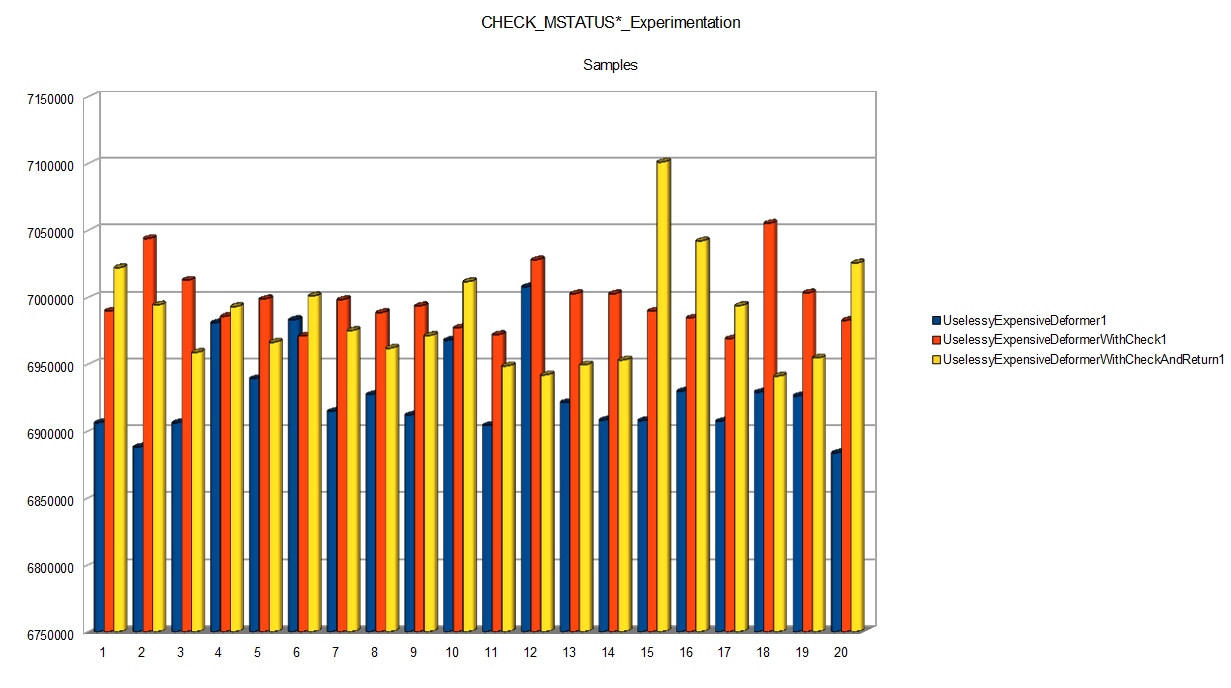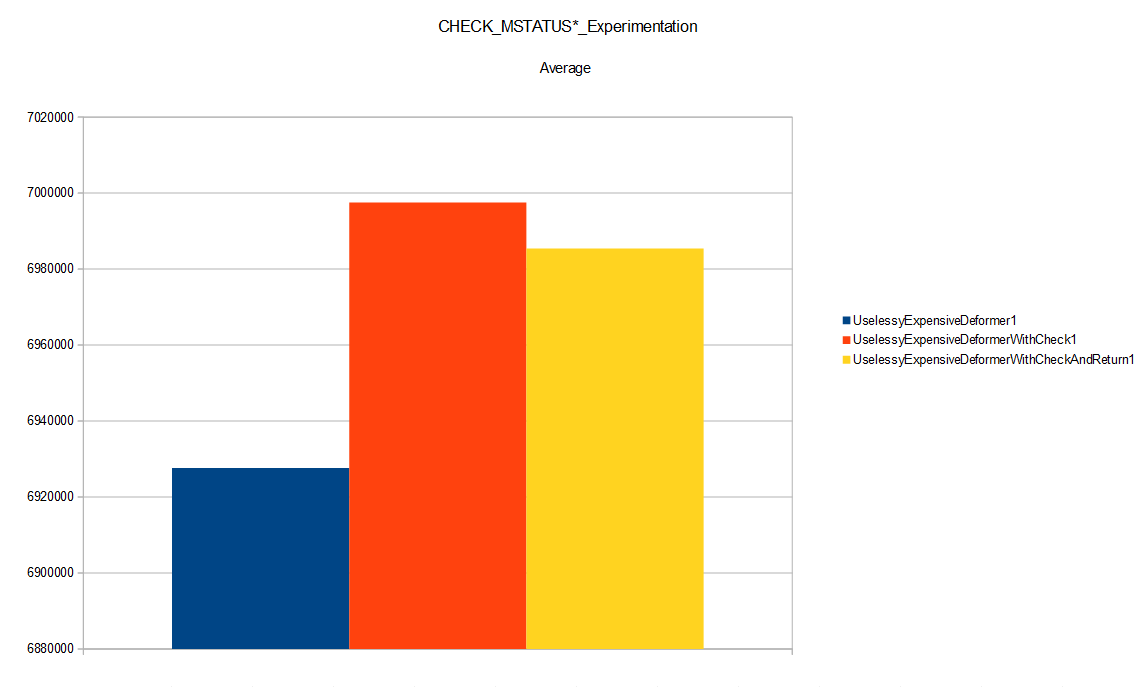Have you ever wondered how checking an MStatus impact your code ?
Well, I recently did. I actually use the CHECK_MSTATUS* macros a lot in the first drafts of my plugins. While it usually won’t matter in an MPxNode::initialize, for example, I was pretty curious about the performance of these macros. Before diving in the experimentation let’s introduce them.
The MStatus class…
As you may know the Maya API provides an MStatus class ( this is actually true for the C++ API only as both the Python and .NET API provides different error checking mechanism ) that is, mostly, ubiquitous in the API methods returns or paramaters. The MStatus class is used to perform error checking on a function execution and can be checked to control the program execution. An example may be the following:
MStatus uninitializePlugin(MObject obj) {
MStatus status{};
MFnPlugin plugin{obj};
status = plugin.deregisterNode(FictionalNode::typeId);
if ( status != MStatus::kSuccess ) {
status.perror("Error deregistering FictionalNode.");
return status;
}
return MStatus::kSuccess;
}
Sidenote:
There exists a Macro that evaluates to true if the MStatus is not MStatus::kSuccess. The if-statement could be rewritten as such:
if ( MFAIL(status) ) { status.perror("Error deregistering FictionalNode."); return status; }
I never found myself using it but it’s a question of style.
As most ( maybe all? I’m not actually sure about this ) methods that do not need to return a value directly, deregisterNode returns an MStatus. Most ( here again it may be all ) API methods that need to return a value provides an optional out_parameter to provide MStatus checking.
…and CHECK_MSTATUS* macros
Checking an MStatus is a tedious and repetitive process. As such, the Maya API provides us with three Macros to check an MStatus and print an error. They’re the following:
#define CHECK_MSTATUS ( _status )
#define CHECK_MSTATUS_AND_RETURN ( _status, _retVal )
#define CHECK_MSTATUS_AND_RETURN_IT ( _status )
All of them prints an error if the MStatus is not Mstatus::kSuccess. Furthermore CHECK_MSTATUS_AND_RETURN and CHECK_MSTATUS_AND_RETURN_IT returns _retVal and _status respectively in case of a not MStatus::kSucces _status. Here you can see an example of their uses:
MStatus UselessyExpensiveDeformerWithCheck::initialize()
{
MStatus status{};
MFnNumericAttribute nAttr;
animateMe = nAttr.create("animateMe", "anm", MFnNumericData::kDouble, 0.0, &status);
CHECK_MSTATUS_AND_RETURN_IT(status);
CHECK_MSTATUS(nAttr.setKeyable(true));
CHECK_MSTATUS(addAttribute(animateMe));
CHECK_MSTATUS(attributeAffects(animateMe, outputGeom));
return MStatus::kSuccess;
}
One notable thing about the CHECK_MSTATUS_AND_RETURN_IT is its definition:
#define CHECK_MSTATUS_AND_RETURN_IT(_status) \
CHECK_MSTATUS_AND_RETURN((_status), (_status))
Here you should be careful about what you pass to it since _status will be expanded two times and that could be a cause of side-effects ( it usually won’t be a concern with how this macro is used but it’s good to know ). This is all you need to know about MStatus and the CHECK_MSTATUS* macros.
Finally let’s experiment a little!
For this experimentation I’ve prepared some simple deformers which present the following main loop:
for (unsigned int vertexIndex{ 0 }; vertexIndex < vertexCount; vertexIndex++, iterator.next()) {
MPoint point = iterator.position(MSpace::kObject, &status);
point.z = std::pow(std::pow(point.x, 8), std::floor(point.y / 8)) * 5;
vertexPositions[vertexIndex] = point;
}
There are equivalent versions that checks the MStatus from iterator.position. All in all it’s just a useless calculation used as an excuse for the experimentation.
The plugin was developed with Maya 2017 update 4 using Maya 2017 update 4 C++ API* on Visual studio community 2017. The tests were run on Maya 2017 update 4 and profiled with std::chrono using a 1 sample per 100 calls rate.
One test scene was prepared for each deformer (1 without status checking, 2 with status checking). The test scene consists of 1 polyShpere with 633602 vertices with the deformer attached. The deformer had an output-affecting value animated linearly from 0.0 to 1.0 on a 2000 frame timeline at 24fps. The profiling was done on multiple playback of this animation.
The test rig was the following:
CPU: Intel Core i7-3930k @ 3.20GHz
RAM: 16GB ddr4
GPU: Geforce GTX 680
On a Windows 7 home premium 64 bit OS
Some result to crunch


As we can see here there is a (depending on context) slight change in performance. An interesting thing to note, that appeared in all the tests, is that the deformer which uses CHECK_MSTATUS_AND_RETURN actually seems to perform a bit better than the version which uses* CHECK_MSTATUS*. I didn’t expect it. Both of them, though, are trashed by the version without checking, with almost a full second of difference.
Conclusion
Well, this was mostly a quench my thirst experimentation. The result were mostly expectable. We should keep MStatus checking as much as possible out of our performance-dependant code, furthermore we avoid to introduce more branching by not using them. Most of the MStatuses are usually not worth checking at all anyway. Sometimes there is a possibility that some code may become risky if a Maya method fails but most methods aren’t going to fail in normal conditions if used correctly. I still think, and as style choice it is my preference, that checking the statuses on the first drafts of the code is good practice to avoid or find more easily typos, bugs or misuses of the API. This doesn’t mean that we should never use them in finalized code. There are cases where it is worth it to be sure the plugin won’t crash in the improbable case that some simple API method goes wrong.